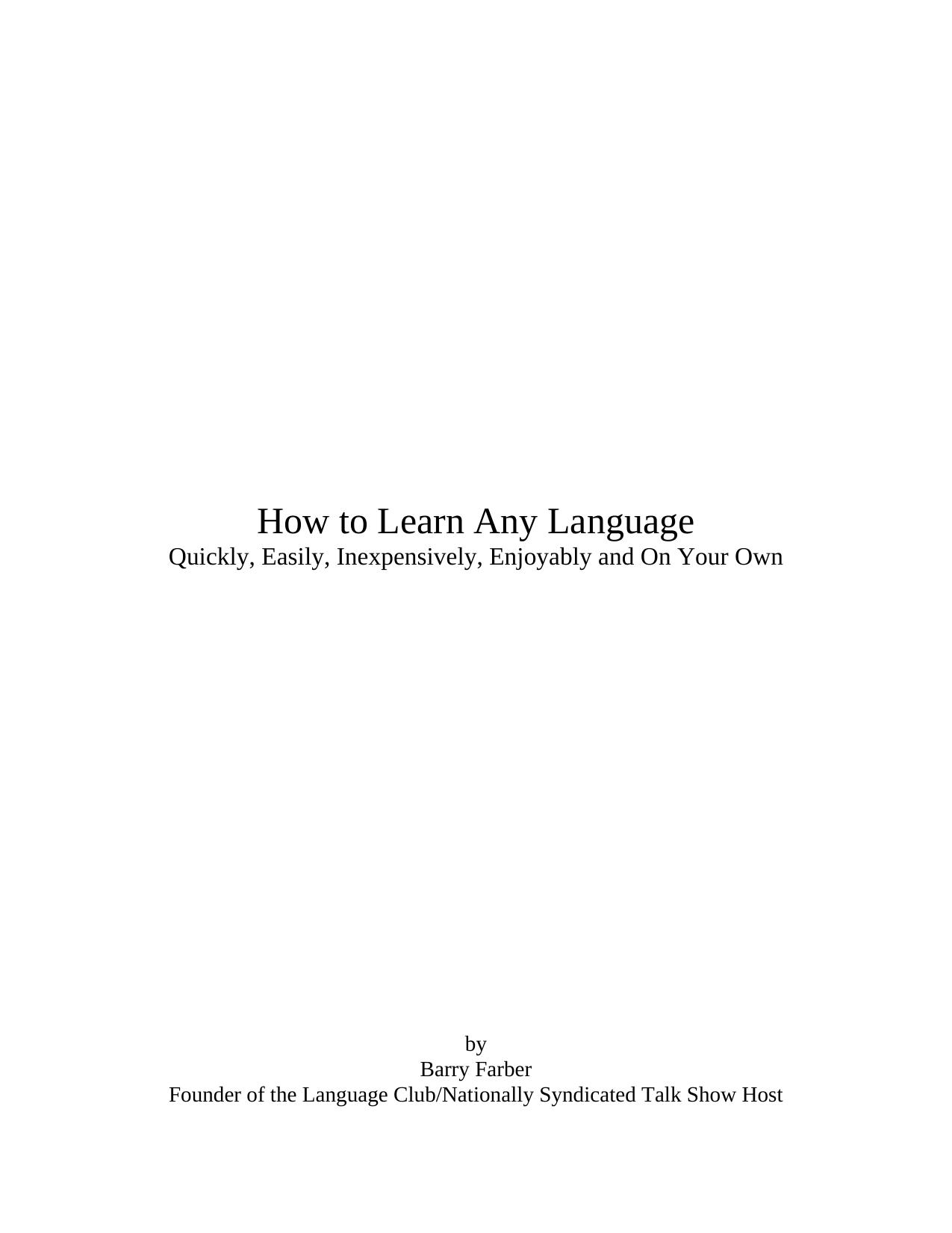How to Learn Any Language by Barry Farber

Author:Barry Farber
Format: mobi, epub, pdf
Tags: Language learning
Published: 2009-12-26T18:54:55+00:00
Un-American Sounds
So far we’ve shied away from words containing sounds that don’t exist in English. The real world won’t be so protective.
“Un-American” sounds are exaggerated as an obstacle to progress in most languages. I say that not because it’s unimportant to master the sounds correctly, but because most of them will enter your repertoire automatically with practice. The trilled r in Spanish, the French r that sounds as though it issues from inside the pituitary gland, the half- sh half-guttural in German, the double consonant in Finnish, the many umlauted u’s and a’s and o’s in the various European languages will all be explained in your grammars, and better than explained on your cassettes: they’ll be pronounced. Many languages carry so many markings and so many different kinds of markings over and under certain of their letters you may be intimidated. Almost all of them are empty threats; despite their sinister looking foreignness, they don’t convey any sounds we don’t have in English.
The two dots over certain a’s in Swedish simply tell you that particular letter is pronounced as the first a in “accurate.” Without the dots, it’s the a in “father.” There’s no need to run from the Norwegian o with a line slicing diagonally down through it: the first e sound in “Gertrude” is close enough. Languages with the double consonant spend far too much time warning us Americans that this is something strange to us. It is not strange. We have double consonants too, maybe not inside the same word, but definitely inside the same phrase.
We pronounce the last sound of the first word and the first sound of the last word in
“late train.” We don’t say “lay train.” So much for the frightening double consonant. We’ll make no attempt here to teach you the “click” sounds of some of the languages in South Africa or the larynx twisting sounds of the Georgian language spoken in Soviet Georgia that actually sounds like paper ripping inside the speaker’s throat. Those sounds are unrepeatable for most Americans and the languages in which they appear are mercifully obscure.
There is really only one sound that doesn’t exist in English that we’re obliged to learn well, and that’s the guttural common in Hebrew, Arabic, Russian, Dutch, and several other languages.
Most textbooks are notoriously weak in conveying that sound. They know they’re committing consumer fraud when, as they frequently do, they merely advise the American student to “approximate the ch sound in the German name ‘Bach’ or the final sound in the Scottish word ‘Loch.’”
However, “Bach” is not pronounced bak. “Loch” is not pronounced lock.
“Chanukah” is not pronounced Ha-na-ka. The trick is to learn how to make the real sound.
The best method, though perhaps inelegant, is to imagine that you’re about to say the plain old h sound, and suddenly you feel a terrible tickle in the middle of your throat. The original h sound then becomes lost in all the other powerful things you now do. Clear your throat violently to eject the irritant causing that tickle.
Download
How to Learn Any Language by Barry Farber.epub
How to Learn Any Language by Barry Farber.pdf
This site does not store any files on its server. We only index and link to content provided by other sites. Please contact the content providers to delete copyright contents if any and email us, we'll remove relevant links or contents immediately.
The Art of Coaching Workbook by Elena Aguilar(51185)
Trainspotting by Irvine Welsh(21648)
Twilight of the Idols With the Antichrist and Ecce Homo by Friedrich Nietzsche(18629)
Fangirl by Rainbow Rowell(9234)
Periodization Training for Sports by Tudor Bompa(8261)
Change Your Questions, Change Your Life by Marilee Adams(7769)
This Is How You Lose Her by Junot Diaz(6881)
Asking the Right Questions: A Guide to Critical Thinking by M. Neil Browne & Stuart M. Keeley(5766)
Grit by Angela Duckworth(5612)
Red Sparrow by Jason Matthews(5468)
Paper Towns by Green John(5185)
Room 212 by Kate Stewart(5113)
Ken Follett - World without end by Ken Follett(4726)
Housekeeping by Marilynne Robinson(4438)
The Sports Rules Book by Human Kinetics(4381)
Double Down (Diary of a Wimpy Kid Book 11) by Jeff Kinney(4266)
Papillon (English) by Henri Charrière(4265)
The Motorcycle Diaries by Ernesto Che Guevara(4093)
Exercise Technique Manual for Resistance Training by National Strength & Conditioning Association(4069)
